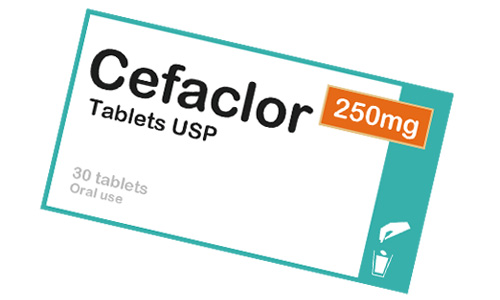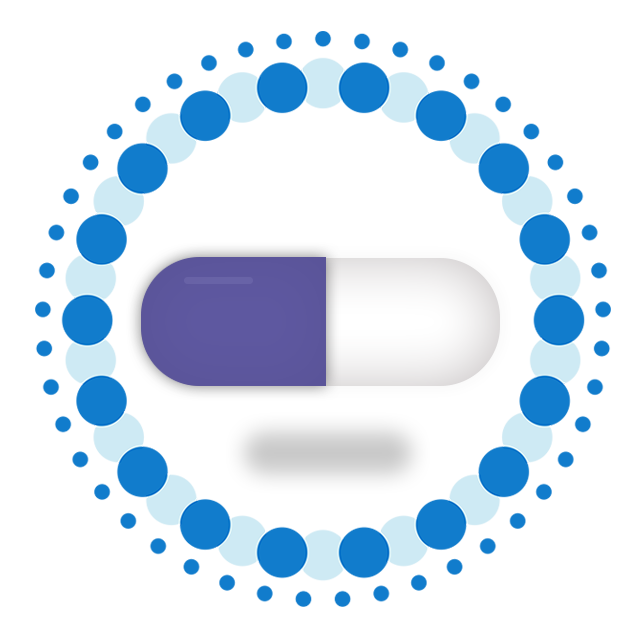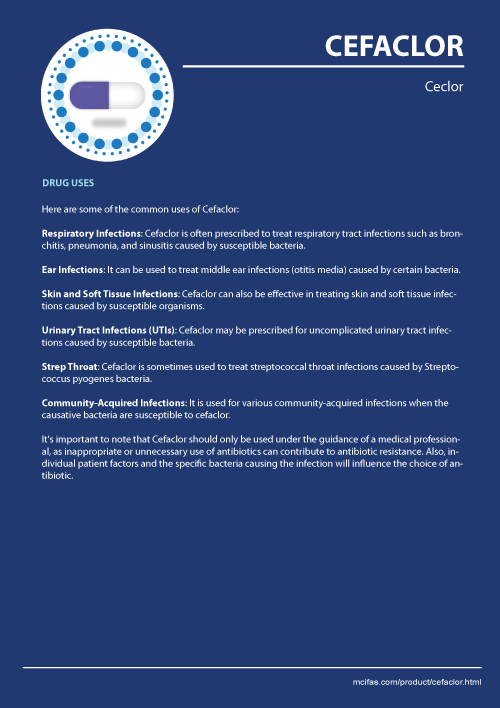Cefaclor Prescribing Information
This medicine is sold under the brand name Ceclor. It is a cephalosporin antibiotic of the second generation. It treats a wide variety of bacterial infections. It kills the bacteria by interfering with the formation of the bacteria`s cell wall. Once the wall is ruptured it results in the death of the bacteria. It belongs to the antibiotic group known as cephalosporins.

Mechanism of action (MOA)
Cefaclor works by blocking the bacterial cell wall and it binds to different proteins than those of penicillin. Rapid cell wall synthesis occurs when the organisms are actively multiplying. Therefore it is non toxic to man. The peptidoglycan strands in the bacterial cell wall. It interferes with the formation of bacterial cell wall while it’s still growing. It ruptures because of weakening of cell wall.
Uses of Cefaclor
Here are some of the common uses of Cefaclor:
- Respiratory Infections: Cefaclor is often prescribed to treat respiratory tract infections such as bronchitis, pneumonia, and sinusitis caused by susceptible bacteria.
- Ear Infections: It can be used to treat middle ear infections (otitis media) caused by certain bacteria.
- Skin and Soft Tissue Infections: Cefaclor can also be effective in treating skin and soft tissue infections caused by susceptible organisms.
- Urinary Tract Infections (UTIs): Medicine may be prescribed for uncomplicated urinary tract infections caused by susceptible bacteria.
- Strep Throat: Cefaclor is sometimes used to treat streptococcal throat infections caused by Streptococcus pyogenes bacteria.
- Community-Acquired Infections: It is used for various community-acquired infections when the causative bacteria are susceptible to cefaclor.
It's important to note that Cefaclor should only be used under the guidance of a medical professional, as inappropriate or unnecessary use of antibiotics can contribute to antibiotic resistance. Also, individual patient factors and the specific bacteria causing the infection will influence the choice of antibiotic.
Dosage and Administration
The tablet should be taken with a glass of water preferably after taking your meals or after 30 minutes of taking the meal. The usual adult dose is 0.5 – 1.0 g 8 hourly. The dose should be given in accordance to prescription. If the medicine is in liquid form please shake the bottle before you use it. You can store it in a cool place but do not freeze it.
Side Effects of Cefaclor
Like all medicines even Cefaclor has many side effects. However, it may not be relevant to all the patients. Some patients may or may not have any side effects. If in case you see any new symptoms after using this medicine, talk to your doctor immediately. Some of the common symptoms are
- Headache
- Mild diarrhea
- Nausea
- Sinus infection
- Tiredness
- Vomiting.
Apart from these common side effects, there can be various severe side effects as well. Get immediate medical help for the below symptoms.
- Rash
- Fever
- Bloody stool
- Hives
- Unable to breathe
- Swelling of the face, tongue or mouth
- Irregular bowel movement
- Vaginal discharge
- Severe diarrhea
- Stomach pain
Precaution and Warning
Some medicines are harmful when taken with other medicine. Therefore please consult your doctor regarding any medicines you are taking beforehand. Also give your full family and personal history. Some allergies may trigger due to taking two medicines together. If you already have allergic reaction to any medicine let your doctor know.
Some patients may develop hypersensitivity reactions following Cefaclor, please stop the medication immediately and get in touch with your doctor.
If you had any surgery, tell your physician about it before taking Cefaclor. Do not discontinue the medication abruptly without consulting doctor.
Contraindications of Cefaclor
This medicine is not effective for treating viral infections. This medicine is not for regular use without the doctor's advice. If this medicine is used repeatedly for a long term, it can cause a second infection. If you have any allergy to this medicine or if you are taking any prescription, non-prescription, or herbal medicine, then inform your doctor about the same. If you have a liver, kidney, phenylketonuria, or blood clotting disorder, then this medicine can cause severe side effects. Medicines such as probenecid and warfarin can increase the side effects of this medicine. You should check with your health care provider if you are using any medicine and when it will be safe to start or stop any medicine. Any changes in the dose of any medicine should also be discussed prior to making the changes. Follow the instructions on the prescription or as suggested by the doctor. It can be taken with or without food and you should chew it, before swallowing the medicine. Make sure that you take this medicine at the same time every day to increase the effectiveness of the medicine. The symptoms of the infection may improve before the full course of the medicine is over. It is important that you continue to use the medicine and complete the full course. Failing to do so can repeat the infection. Overdose of this medicine can be harmful and life threatening. It can also, give false results in certain tests, hence let the doctor know that you are using the medicine.
Pregnancy and Cefaclor
You should discuss the benefits and risks of using this medicine during pregnancy. This medicine can pass through the breast milk to the nursing child and may harm the child.
It is not entirely known if it affects pregnant women. Ask your doctor regarding this and if gives you a thumps up then only take it. It may secrete into milk in small quantities that does not harm anybody.
Drug Interaction
Cefaclor can potentially interact with other drugs, which can affect its effectiveness, increase the risk of side effects, or alter the way it is metabolized in the body. Here are some important interactions to be aware of:
- Probenecid: Probenecid can delay the excretion of Cefaclor from the body, potentially leading to increased drug levels and an increased risk of side effects.
- Antacids: Some antacids containing aluminum or magnesium hydroxide can reduce the absorption of Cefaclor, so it's recommended to take them at least 1 hour before or 2 hours after taking tablets.
- Iron Supplements: Iron supplements can also reduce the absorption of Cefaclor, so it's advisable to separate the doses by a few hours.
- Oral Contraceptives: There have been reports of decreased effectiveness of hormonal contraceptives (birth control pills) when taken concomitantly with antibiotics like Cefaclor. This can potentially lead to unintended pregnancies. It's recommended to use alternative methods of contraception during cefaclor treatment.
- Nephrotoxic Drugs: Cefaclor can have potential interactions with nephrotoxic drugs, like aminoglycoside antibiotics and certain diuretics, which could increase the risk of kidney damage.
- Warfarin: There have been reports of Cefaclor potentially increasing the effects of warfarin (a blood thinner), leading to an increased risk of bleeding. Close monitoring of blood clotting parameters is advised if these medications are taken together.
- Lactulose: Cefaclor may cause false-positive results in certain tests for sugar in the urine, such as the Benedict's solution, Fehling's solution, or Clinitest tablets. Lactulose, a medication used to treat constipation, can also cause false-positive results in these tests.
» Drug Uses (format pdf, 0.2 Mb)



